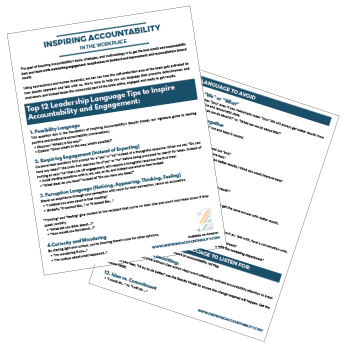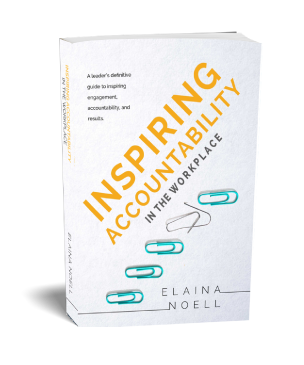How Do I Address an Employee Overstepping Boundaries?

September 12, 2020
How Do I Address an Employee Overstepping Boundaries?
One of the trickiest challenges to address with employees is when you experience an employee overstepping boundaries, especially if it seems they’re trying to overstep you!
You don’t want to come off defensive or threatened, but you do need to address it (since what you don’t address, you approve).
Let’s look at a few of these challenges you might face with employees, and how Inspiring Accountability methodology can help you address them.
Addressing three scenarios of an employee overstepping boundaries
SCENARIO ONE: I’ve asked my employee to do/not do [this] many times, and they still do.
When boundaries keep getting broken or expectations keep going unmet, you likely need to offer more clarity or more effective “revisiting.”
Revisiting refers to following-up on an employee’s progress toward meeting a clear expectation, ideally using the Inspiring Accountability Results Model format. The combination of a clear expectation and revisiting creates effective accountability.
In this case, it sounds like your employee needs a good accountability anchor to work on with you! Inspiring Accountability created the ultimate accountability conversation model to help you improve accountability and results from employees who are not meeting expectations, especially if you keep reminding them. But accountability always requires revisiting, and reminding is not revisiting.
Here are a few quick questions you can use to help get you started:
- Is my request stated with actionable clarity, meaning so clear that my employee knows how to take action to meet the expectation without much thought or evaluation needed? Is it in writing?
- Have I explored what’s in the way and what’s possible for the employee to meet this expectation?
- How am I revisiting this expectation in a way that supports their success in meeting it?
NOTE: If you want to learn the official process of how to create accountability anchors and effectively revisit them until your employee meets your expectation, we teach this process in our signature course and book.
“Accountability always requires revisiting, and reminding is not revisiting.”
Here’s a second scenario of how this issue could present:
SCENARIO TWO: My employee often attempts to overrule me in meetings. Perhaps they are outspoken, act like they’re the boss, or don’t show respect when you make a final decision.
What do you do with employees who think they are the boss?
A few things could be going on here. Start by seeking actionable clarity on the specific behavioral issue you want to improve.
Are they not listening or considering other’s viewpoints, convinced they are always the best with no need to consider others?
Employees often want to be seen as “the expert” in their role. After all, they are the one facing the role’s unique challenges each day. Unfortunately, some employees easily forget that everyone else is also an expert in their respective roles. It can be easy to underestimate what others know or successfully persevere through every day.
You can start by reflecting on the easiest aspect to influence… your own behavior!
Are you listening to your employees to validate their ideas and perceptions, even if you don’t agree? Are you explaining your decisions, tying evidence to action? Of course, you don’t have to do this, but it sure helps with engagement and keeping employees more receptive and respectful.
If they are not respecting your decisions, they may be feeling excluded from the conversation. Sometimes listening to and valuing their “expertise” can make a shift.
If it’s more serious than this, our third scenario will guide you on how to address this issue with them more directly.
And here’s a third scenario you may encounter of an employee overstepping boundaries:
SCENARIO THREE: My employee gives me advice in a way that feels condescending instead of being engaged and eager to contribute.
This one is tricky. As we covered in our blog on how to lead by example, an essential part of our 4C’s leadership approach is to be Careful not to give feedback that doesn’t acknowledge good intent while commenting on poor execution.
In this case, your employee may feel passionate about being great at what they do, and you don’t want to damage this engagement. What want to do is get specific on what needs to change in their execution.
What behavior do you specifically want them to demonstrate differently? Some possibilities might include:
- Ask questions instead of “tell” advice
- Maintain a positive demeanor (instead of exhibiting frustration) when delivering ideas and feedback.
- Use “I” statements instead of “you should” or “we need to” (Every should can be a question with could.)
Here’s one way you could deliver this new expectation: “I want to maintain a more supportive, collaborative, and cooperative tone in our conversations. Here are some ways I’d like you to contribute to this: (list what you came up with).”
You can then also ask if they have ideas for you to better contribute to this goal to help your employee stay receptive and feel this is truly a goal, not a pointed criticism packaged in a package. Even though this might be true, you’ll get better results (and more respect) by approaching them with more respect.
This scenario would also be served with the Results Model process to present and revisit this new desired result.
In summary, if you have an employee that is overstepping their boundaries, you will want to:
- Get clear on the actual behaviors you’d like to change
- Create a clear expectation around it
- Revisit it regularly, ideally with the Results Model process, until the change has become their new default behavior.
–
We’re here to help by offering Inspiring Accountability training, consulting, and coaching, along with our signature book and online course. Connect with us to see how we can support you and your team!
Get Our Best Inspiring Accountability Resources!
Inspiring Accountability in the Workplace is available on Amazon as a paperback, eBook, and audiobook.
Or learn online with our signature course: The Brain’s Secrets to Inspiring Accountability Crash Course.
GET ACCESS TO OUR BEST TIPS
Download our Top 12 Leadership Language Tips to Inspire Accountability and Employee Engagement



